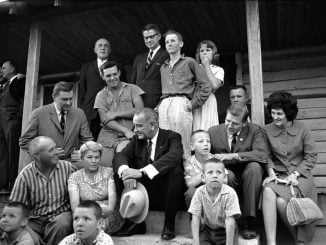
Jan. 9
1861: Mississippi became the second state to secede from the Union.
1916: The World War I Battle of Gallipoli ended with an Ottoman Empire victory as Allied forces withdrew.
1945: During World War II, the Battle of Luzon got underway, resulting in an Allied victory over Imperial Japanese forces.
2007: Apple CEO Steve Jobs introduced the iPhone at the Macworld conference in San Francisco.
Jan. 10
1776: Thomas Paine anonymously published his influential pamphlet, “Common Sense,” which argued for American independence from British rule.
1861: Florida became the third state to secede from the Union prior to the Civil War.
1982: San Francisco 49ers receiver Dwight Clark caught a touchdown pass from Joe Montana with 58 seconds left in the NFC Championship Game; one of the most famous plays in NFL history, known as “The Catch.”
Jan. 11
1861: Alabama became the fourth state to declare its secession from the Union.
1908: President Theodore Roosevelt leveraged the Antiquities Act to proclaim the Grand Canyon as a national monument; it would become a national park in 1919.
1920: The League of Nations was established as the Treaty of Versailles went into effect.
1964: U.S. Surgeon General Luther Terry issued “Smoking and Health,” stating that “cigarette smoking contributes substantially to mortality from certain specific diseases and to the overall death rate.”
Jan. 12
1773: The first public museum in America was organized in Charleston, South Carolina.
1959: Berry Gordy Jr. founded Motown Records in Detroit.
1971: The groundbreaking situation comedy “All in the Family” premiered on CBS television.
1976: Mystery writer Dame Agatha Christie died at age 85.
Jan. 13
1733: James Oglethorpe and some 120 English colonists arrived at Charleston, South Carolina, while en route to settle in present-day Georgia.
1941: A new law went into effect granting Puerto Ricans U.S. birthright citizenship.
1982: An Air Florida 737 crashed into Washington, D.C.’s 14th Street Bridge and fell into the Potomac River while trying to take off during a snowstorm, killing 78 people.
Jan. 14
1784: The United States ratified the Treaty of Paris, ending the Revolutionary War; Britain followed suit in April 1784.
1858: Napoleon III, Emperor of the French, and his wife, Empress Eugenie, escaped an assassination attempt led by Italian revolutionary Felice Orsini.
1914: Ford Motor Co. greatly improved its assembly-line operation at its Michigan plant by employing an endless chain to pull each chassis along.
1963: George C. Wallace was sworn in as governor of Alabama with the pledge, “Segregation forever!” — a view Wallace later repudiated.
Jan. 15
1865: Union forces captured Fort Fisher near Wilmington, depriving the Confederates of their last major seaport.
1892: The original rules of basketball, devised by James Naismith, were published.
1929: Civil rights leader Martin Luther King Jr. was born in Atlanta.
1943: Work was completed on the Pentagon, the headquarters of the U.S. Department of War (now Defense).
1973: President Richard M. Nixon announced the suspension of all U.S. offensive action in North Vietnam.
1974: “Happy Days” premiered on ABC-TV.


